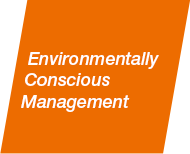
Creating a Society in which People and Cars are in Harmony with the Environment
As a company involved in a business related to cars, we continuously work to reduce the environmental impact of our business activities and, through the merchandise and services we offer, contribute to the development of a sustainable society in which cars are an important element.
AUTOBACS SEVEN Environmental Policy
AUTOBACS SEVEN is committed to activities with considerations to environmental conservation in carrying out its business activities on sales of automotive related goods, statutory safety inspections and maintenance, and car sales.
- The Company will grasp the environment impacts of its business activities to determine the objectives, targets and plans for continuous improvement of environmental conservation activities.
- The Company will comply with laws, regulations and other requirements pertaining to the environment.
- The Company will put priority particularly on the following actions to reduce the relevant environmental impacts among those arising from its business activities.
(1) Promotion of energy saving practices and reduction of greenhouse gas emissions
(2) Reduction of waste emissions and promotion of 3R activities
(3) Purchases of environmentally friendly items
(4) Development of environmentally-friendly goods and services and sales promotion of such merchandise and services at stores - The Company will endeavor to prevent environmental pollution.
- The Company will give education to and raise awareness among all its personnel so that they will proactively address the environmental and social issues in an attempt to build a sustainable society with harmony between people and cars.
Environmental Protection Targets and Results
| Area | FY March 2016 Target | Results of Primary Initiatives for FY March 2016 | Plans for FY March 2017 | |
|---|---|---|---|---|
| Pursuit of energy efficiency and greenhouse gas reduction | Reduction of electricity usage (Reduce CO2 emissions) | Approximate 2.0% reduction compared to FY March 2015 | 2.9% reduction compared to FY March 2015 | Maintain same usage level through FY March 2016 |
| Reduction of gasoline usage | Approximate 3.0% increase in fuel efficiency compared to FY March 2015 Switch to fuel-efficient vehicles | 5.0% increase in fuel efficiency compared to FY March 2015 | Maintain same fuel efficiency level through FY March 2016 | |
| Resource-saving Initiatives | Reduction of waste | Approximate 1.0% reduction compared to FY March 2015 | 3.9% reduction compared to FY March 2015 | 2.0% reduction compared to FY March 2016 |
| Reduction of copy paper usage | Approximate 2.0% reduction compared to FY March 2015 | 6.7% reduction compared to FY March 2015 | 2.0% reduction compared to FY March 2016 | |
| Reduction of cardboard usage | Continue existing measures | 51.0% reduction compared to FY March 2012 | ||
| Procurement of environmentally friendly products | Procurement of green office products | Continue existing measures | Green office products accounted for 86.2% of all purchases | Make green office products account for 80% or more of all purchases |
| Environmental communication | Environmental education for employees, and publicizing of activity programs | Continue existing measures | Conduct annual general environmental awareness education and engage in regular distribution of educational information on the environment | Conduct annual general environmental awareness education and engage in regular distribution of educational information on the environment |
| Contribution to local beautification | Neighborhood clean-ups | Participation by all employees | All employees participated | Participation by all employees in at least one activity |
In its effort to advance environmental activities, the Company confirmed its understanding of items to be implemented under ISO’s environmental standards and, to pursue activities at the department level, held three meetings of the Environmental Promotion Committee during the fiscal year ended March 2016. All departments were required to send a representative to participate in these meetings.
It is expected that this initiative will go beyond the promotion of environmental contributions and achieve improvements across a range of issues facing companies - matters such as emergency responses to environmental accidents, and enhancing profitability by improving products and using fewer resources.
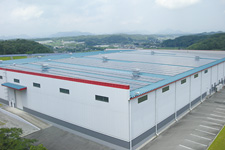
At our Western Japan logistics Center (Miki City, Hyogo Prefecture), we have installed solar panels on a portion of open land and on some of the roof space of the center itself, and are selling the electricity generated. We are working to make more effective use of our assets and promote the development of environmentally friendly renewable energy. Through such efforts to meet our corporate social responsibility to reduce our environmental impact, we are contributing to society and effectively advancing environmentally friendly initiatives.
Promoting Energy Saving and Cutting Greenhouse Gases
Formulating Energy-Saving Measures and Cutting CO2 Emissions
Company and Store Initiatives
Every individual employee of the Company follows our environmental policy and is acutely aware of the need to save energy as they engage in business activities at our headquarters, regional offices, directly managed stores, logistics centers, and other sites. For the fiscal year ended March 31, 2016, the Company’s electricity consumption* declined by 4.0% year on year, to 6,810 MWh, and total CO2 emissions* fell by 4.0%, to 4,060 t. To achieve improvements going forward, the Company Group is advancing energy-saving measures, such as a commitment to “no overtime days” enabled by operational improvements and efficiencies. And individual stores, for their part, are taking steps such as introducing dimmable LED lighting and applying thermal insulation coatings to their roofs to keep internal temperatures cooler during the summer. Measures such as these will have benefits for both the environment and the bottom line.
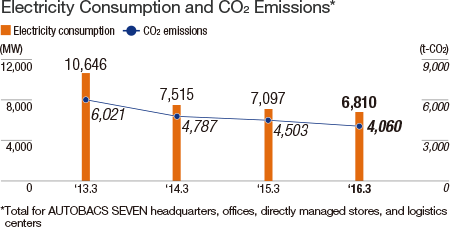
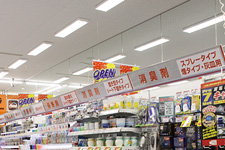
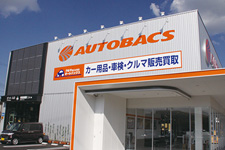
Resource–Saving Initiatives
Practicing the 3Rs for Effective Use of Limited Resources
Reducing the Use of Containers and Packaging
During the fiscal year ended March 31, 2015, the Company Group reduced its use of shopping bags and other types of containers and packaging by 23.3% year on year, to 201.3t. Reduction in the use of shopping bags was accomplished in part by asking customers for their understanding and cooperation in using fewer bags. In addition, for AUTOBACS private brand items, we are gradually transitioning to packaging materials
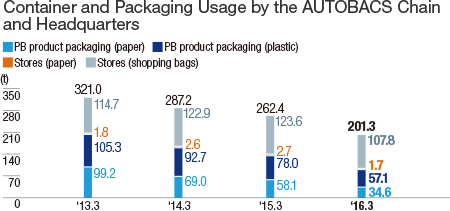
Distribution Initiatives
When speed is not a factor, we choose to move products by rail, which entails relatively low CO2 emissions, rather than by truck. In addition, we employ reusable collapsible containers in various sizes to distribute products to stores. Doing this reduces the amount of cardboard that must be discarded.
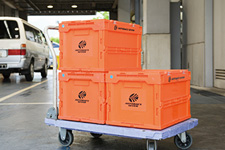
Reducing Waste and Pursuing Proper Processing and Recycling
For ordinary waste, the kind generated in offices, we routinely remind employees of the importance of separating these items into paper, plastic, and other categories. We also continuously urge efforts to reduce waste generation.
Waste from the maintenance work performed in store service bays is handled differently. This material is entrusted to legally compliant industrial waste management companies for proper disposal and recycling. Furthermore, we use our own methods to confirm that these companies are properly performing the services for which we have commissioned them.
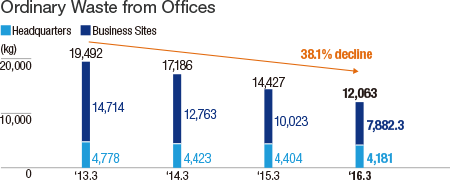
Waste Recycling Initiatives
1. Waste Tires
Special contractors shred the tires, which are mainly used for fuel at cement and paper plants, with some of the material also used in cement.
2. Waste Oil
Specialist contractors refine and recycle the oil, which is used mainly as boiler fuel.
3. Waste Batteries
Specialist contractors recycle the lead and plastics to create new batteries.
